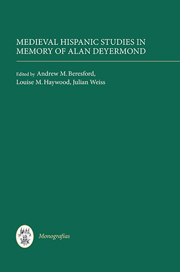Book contents
- Frontmatter
- Contents
- Contributors
- Foreword: Alan Deyermond: A Memoir
- Acknowledgments
- Abbreviations
- Introduction: Alan Deyermond, 1932–2009
- 1 Sanctity and Prejudice in Medieval Castilian Hagiography: The Legend of St Moses the Ethiopian
- 2 The Image of the Phoenix in Catalan and Castilian Poetry from Ausiàs March to Crespi de Valldaura
- 3 On the Frontiers of Juan Rodríguez del Padrón's Siervo libre de amor
- 4 Memory as Mester in the Libro de Alexandre and Libro de Apolonio
- 5 Advancing on ‘Álora’
- 6 Time is of the Essence: Essence, Existence, and Reminiscence in Two Portuguese Poets
- 7 Gómez Manrique's Exclamación e querella de la governación: Poem and Commentary
- 8 The Misa de amor in the Spanish Cancioneros and the Sentimental Romance
- 9 ‘Manus mee distillaverunt mirram’: The Essence of the Virgin and an Interpretation of Myrrh in the Vita Christi of Isabel de Villena
- 10 ‘Nos soli sumus christiani’: Conversos in the Texts of the Toledo Rebellion of 1449
- 11 Vernacular Commentaries and Glosses in Late Medieval Castile, II: A Checklist of Classical Texts in Translation
- 12 Games of Love and War in the Castilian Frontier Ballads: El romance del juego de ajedrez and El romance de la conquista de Antequera
- 13 ‘Esta tan triste partida’ (Conde Dirlos, v. 28a): maridos y padres ausentes
- Index
- Tabula in memoriam
12 - Games of Love and War in the Castilian Frontier Ballads: El romance del juego de ajedrez and El romance de la conquista de Antequera
Published online by Cambridge University Press: 05 May 2013
- Frontmatter
- Contents
- Contributors
- Foreword: Alan Deyermond: A Memoir
- Acknowledgments
- Abbreviations
- Introduction: Alan Deyermond, 1932–2009
- 1 Sanctity and Prejudice in Medieval Castilian Hagiography: The Legend of St Moses the Ethiopian
- 2 The Image of the Phoenix in Catalan and Castilian Poetry from Ausiàs March to Crespi de Valldaura
- 3 On the Frontiers of Juan Rodríguez del Padrón's Siervo libre de amor
- 4 Memory as Mester in the Libro de Alexandre and Libro de Apolonio
- 5 Advancing on ‘Álora’
- 6 Time is of the Essence: Essence, Existence, and Reminiscence in Two Portuguese Poets
- 7 Gómez Manrique's Exclamación e querella de la governación: Poem and Commentary
- 8 The Misa de amor in the Spanish Cancioneros and the Sentimental Romance
- 9 ‘Manus mee distillaverunt mirram’: The Essence of the Virgin and an Interpretation of Myrrh in the Vita Christi of Isabel de Villena
- 10 ‘Nos soli sumus christiani’: Conversos in the Texts of the Toledo Rebellion of 1449
- 11 Vernacular Commentaries and Glosses in Late Medieval Castile, II: A Checklist of Classical Texts in Translation
- 12 Games of Love and War in the Castilian Frontier Ballads: El romance del juego de ajedrez and El romance de la conquista de Antequera
- 13 ‘Esta tan triste partida’ (Conde Dirlos, v. 28a): maridos y padres ausentes
- Index
- Tabula in memoriam
Summary
In her overview of the symbolism of games in the romancero, Edith Rogers observes that the use of the game as a central motif ‘creates an atmosphere of tension and imminence of change’ relating to a shift of fortune or a reversal of the relative position of two adversaries, while at the same time serving as ‘a visible, condensed, localized expression of the emotional conquest’ involved in courtship (1972: 424). The following analysis seeks to develop Rogers' theory by focusing on two frontier ballads, El romance del juego de ajedrez and El romance de la conquista de Antequera, and the ways in which they employ games – those of chess and of jousting respectively – not only as a means of denoting emotional and military conquest, but as an enduringly evocative means of recalling the unique cultural identity shared by Castilians and Granadans on the medieval frontier that simultaneously foreshadows and resists its demise.
The first of the ballads, El romance del juego de ajedrez, also known as El romance de Fajardo, was a popular feature of Spanish ballad collections printed over the course of the sixteenth century. Pedro Correa documents the poem's presence in as many as seventeen collections printed between 1550 and 1588, its popularity giving rise to several variants and assuring it canonical status within the fronterizo corpus (Correa 1999: 332–3).
- Type
- Chapter
- Information
- Medieval Hispanic Studies in Memory of Alan Deyermond , pp. 273 - 292Publisher: Boydell & BrewerPrint publication year: 2013



